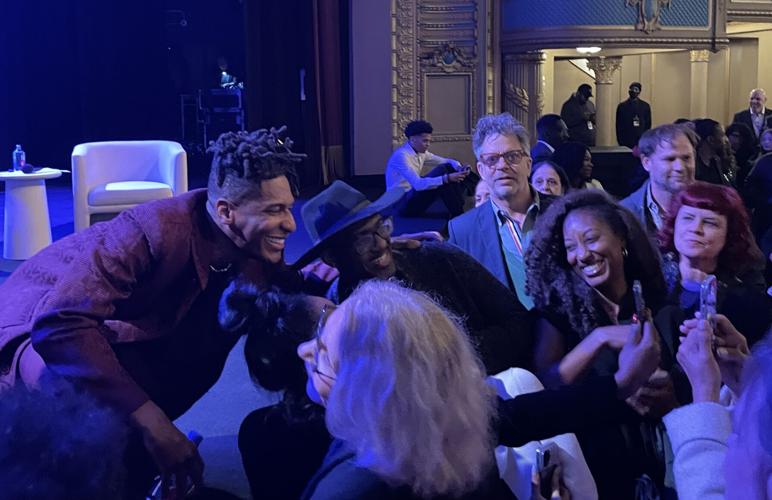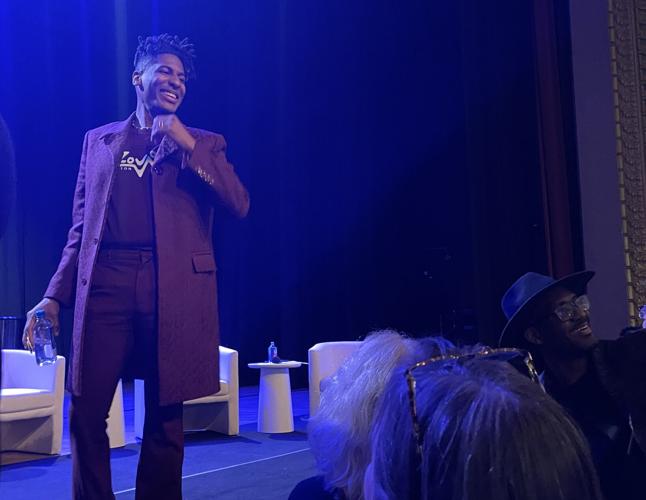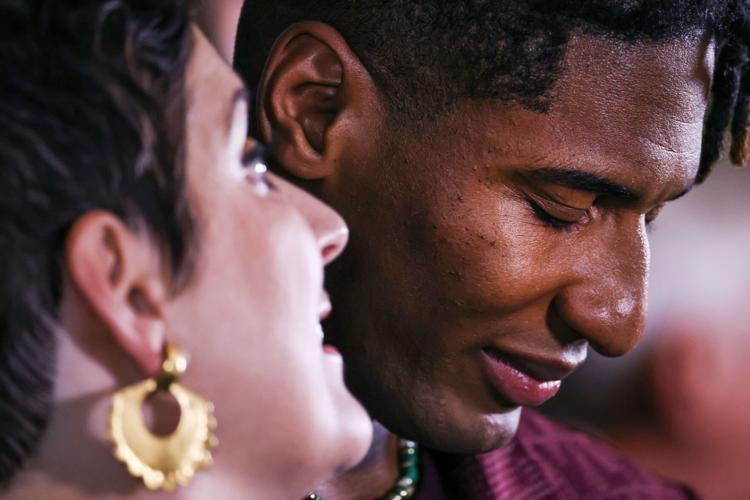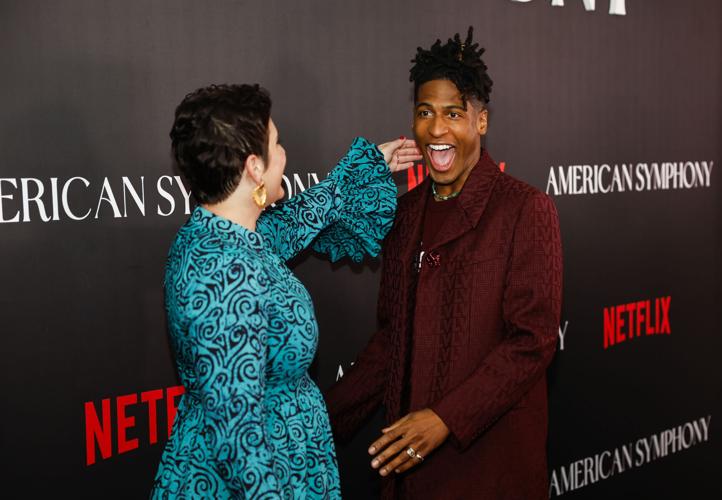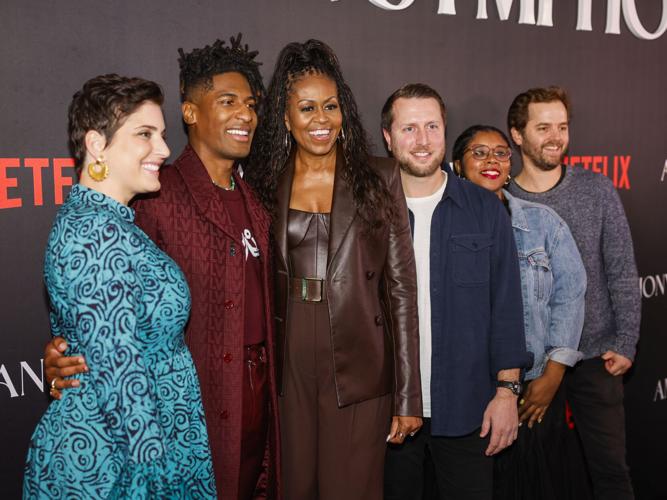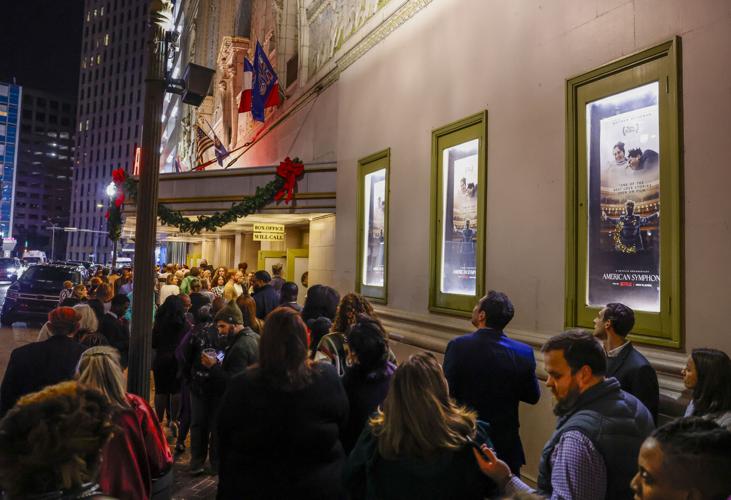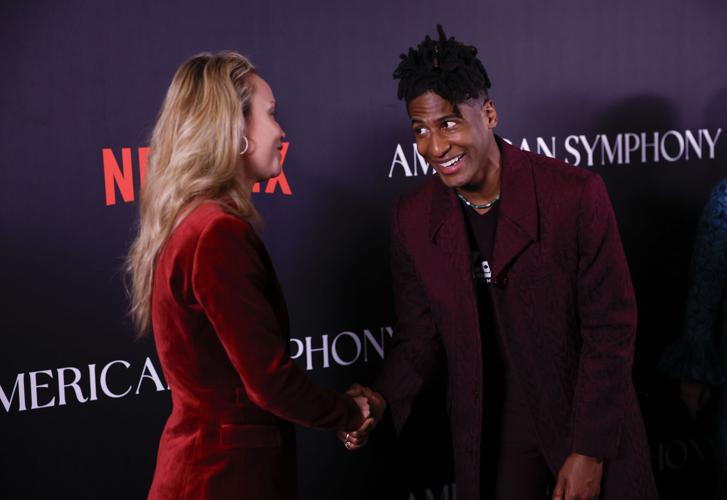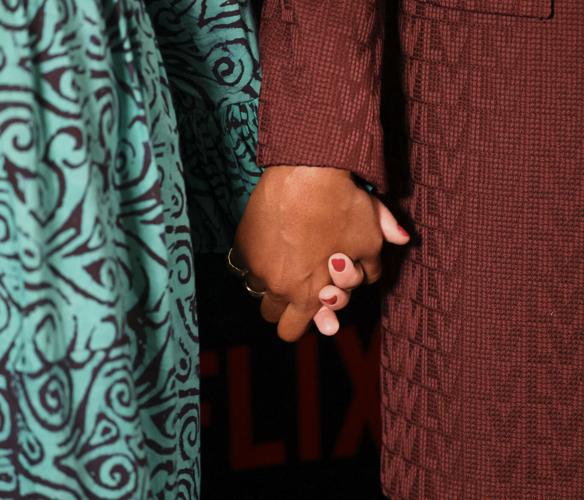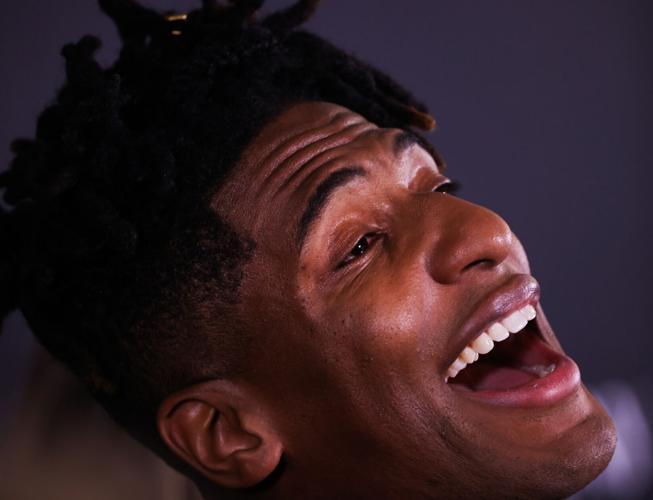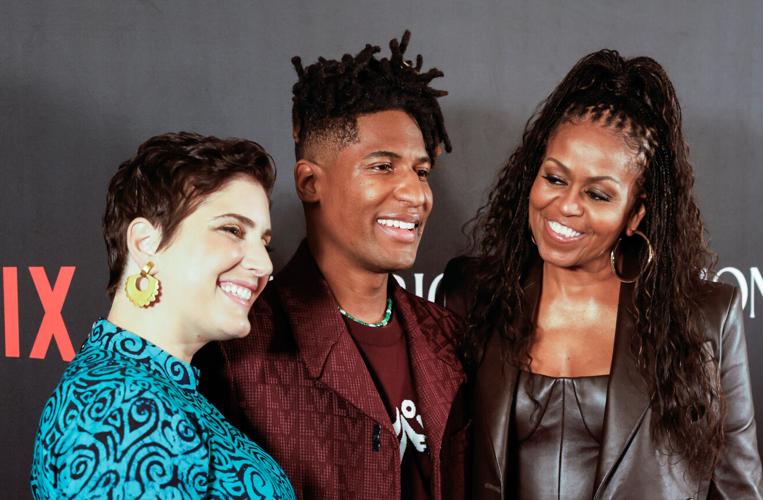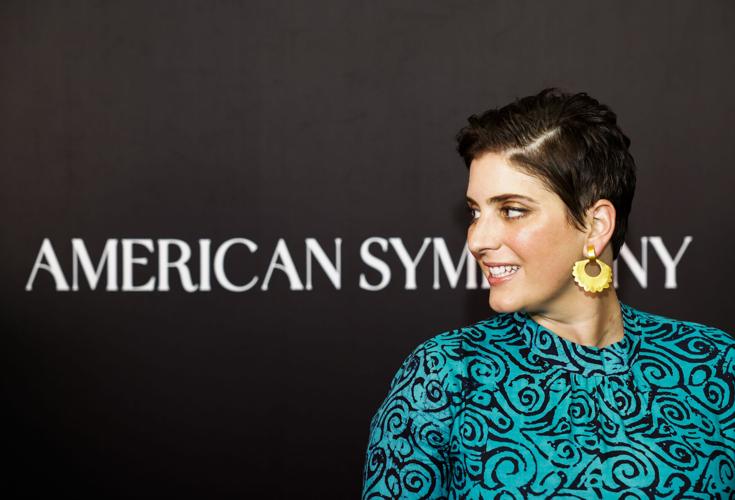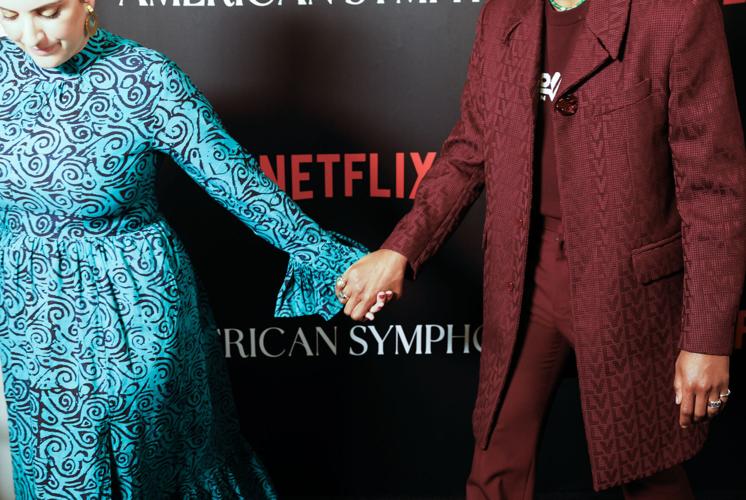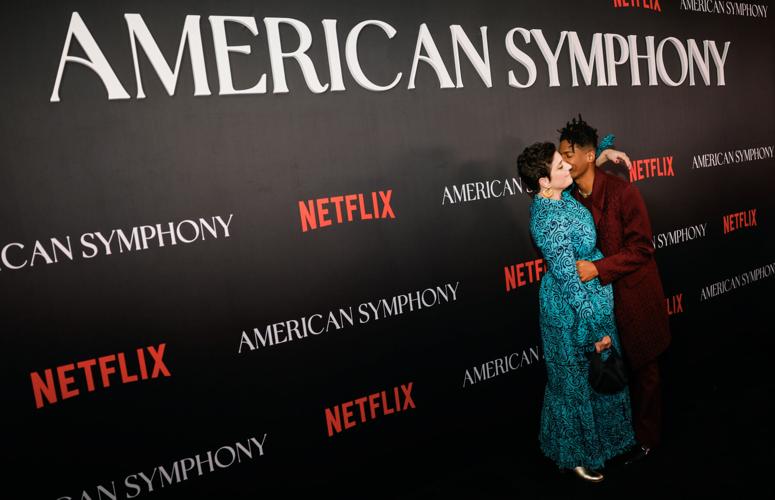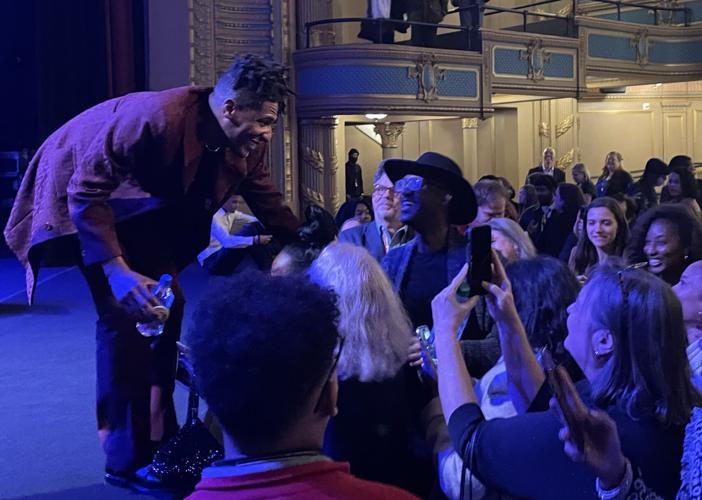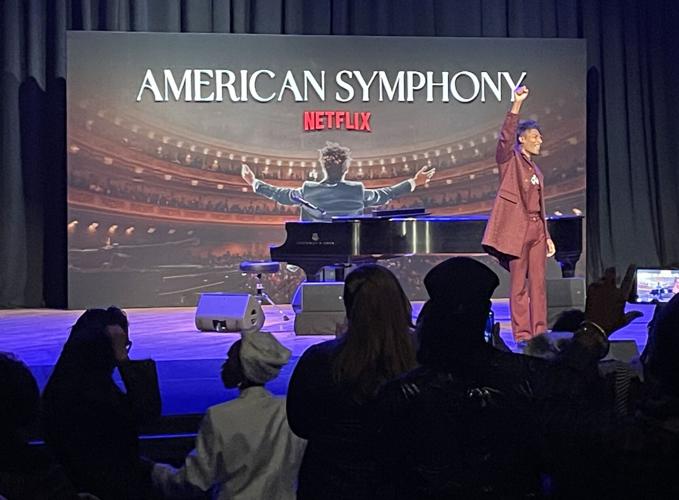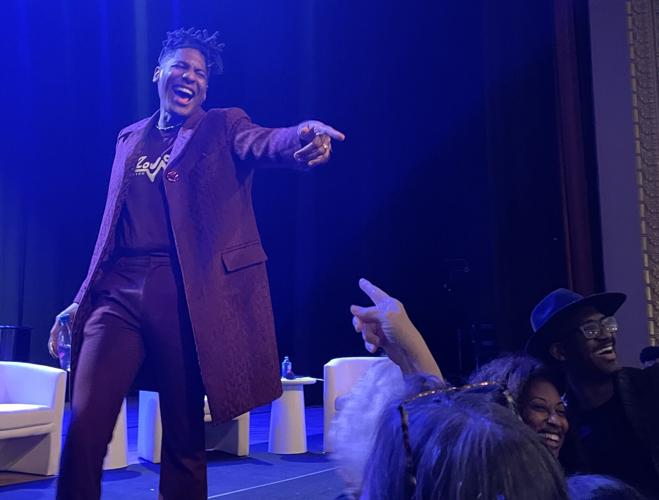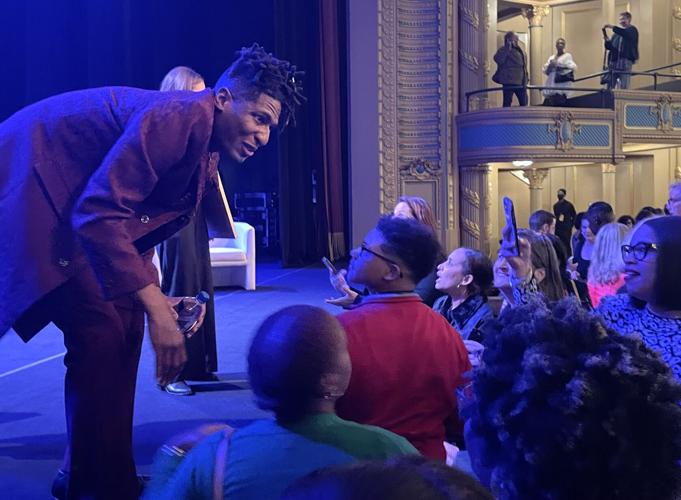Twelve hours after friends, fans, family members and a former first lady joined Jon Batiste at the Orpheum Theater for a screening of “American Symphony,” he was still feeling the love.
“For all that went into this film, it wouldn’t have been possible without the community that was in that room,” he said Friday. “To have them there to celebrate at this moment in the process was, for me, the best-case scenario.”
Drawn from 1,500 hours of footage shot everywhere from the Grammy Awards to cancer wards, the Netflix documentary captures an extraordinary year of extreme highs and lows for Batiste and his wife, author Suleika Jaouad.

Jon Batiste greets guests following a screening of the Netflix documentary 'American Symphony' at the Orpheum Theater in New Orleans on Thursday, Dec. 7, 2023.
Director Matthew Heineman originally envisioned a behind-the-scenes chronicle of Batiste writing an ambitious, multi-genre symphony and assembling a multi-cultural orchestra for a one-night-only performance at New York’s Carnegie Hall.
But life intervened. Batiste’s career suddenly skyrocketed into the stratosphere courtesy of 11 Grammy nominations. The same week, Jaouad learned that the leukemia she successfully battled almost a decade earlier had returned with a vengeance, necessitating a bone marrow transplant.
“So the film changed, obviously,” Batiste said. “That’s how Matt makes films. He always says this quote from a mentor: If you end up with the film that you started with, then you weren’t listening along the way.

Suleika Jaouad, Jon Batiste and Michelle Obama pose during the red carpet event before the premiere of the Netflix documentary "American Symphony" at the Orpheum Theater in New Orleans, Thursday, Dec. 7, 2023. (Photo by Sophia Germer, The Times-Picayune)
“We had conversations over the course of months as to whether to keep filming, and just what the film would be. My wife is an incredible artist. I wanted her to not be flattened in the narrative. I also didn’t want the Grammys trajectory or the career stuff to take over the narrative of the symphony. We all had honest conversations about ... trying to bring together three stories into one.”
“American Symphony” was made under the auspices of Higher Ground Productions, the film company that Barack and Michelle Obama launched in 2018 to produce content for Netflix.
“The first thing I said when we started talking with the Obamas and Netflix is that we have to find a way to bring it back home to New Orleans,” said Batiste, who grew up in Kenner and graduated from St. Augustine High School and the New Orleans Center for Creative Arts, before moving to New York to attend the Juilliard School and launch his career.
“The symphony in and of itself is about the synthesis of all the cultures and genres that are embodied in the fabric of our city. At each screening, you get a sense of the community. I knew that the screening in New Orleans was going to feel exuberant. It felt so alive. It felt like the right place to screen this film.”
'I improvised, man'
Tickets for Thursday’s screening at the Orpheum, mostly distributed by invitation, were free. So were the Goobers and other movie theater snacks handed out in the lobby.

Suleika Jaouad and Jon Batiste on the red carpet prior to a screening of the Netflix documentary "American Symphony" at the Orpheum Theater in New Orleans, Thursday, Dec. 7, 2023. (Photo by Sophia Germer, The Times-Picayune)
Before doors opened to the public, Michelle Obama joined Batiste and Jaouad in the Orpheum’s second-floor lobby to pose for pictures. It was that rare red carpet event at which the Secret Service provided security.
“I was holding that secret for the longest,” Batiste said of Obama’s appearance.
Once the audience had filled the Orpheum’s first floor and lower balcony, Obama delivered a short speech about the film, then introduced Batiste, Jaouad and Heineman.
For the next two hours, the audience absorbed “American Symphony” in all its intimate detail, humor and heartbreak. One moment, Batiste is hugging a gleeful Billie Eilish after his triumphant Grammy Awards performance. The next, he is comforting a tearful Jaouad as a doctor informs her she’ll likely need chemotherapy for the rest of her life.
Tellingly, very few audience members at the Orpheum got up during the screening to visit the open bar in the lobby.
In what turned out to be a perfect dramatic twist for the film, the Carnegie Hall stage lost power during the performance of Batiste’s symphony. He is seen tapping on a sampler that has suddenly gone dead, along with every other electronic instrument onstage.
Months of work hung in the balance as almost 200 musicians and the Carnegie Hall crowd looked at Batiste, silently asking, “What now?”
In that acutely stressful moment, he drew on his New Orleans pedigree and improvised a furious piano solo, a torrent of notes to fill the gap until power was restored.

Jon Batiste performs after a screening of the Netflix documentary 'American Symphony' at the Orpheum Theater in New Orleans on Thursday, Dec. 7, 2023.
“Growing up in New Orleans prepared me to be an improviser,” he said Friday. “I believe everybody in the world is creative, but New Orleans is a real testament to [creativity]. You walk around and anybody you talk to has their own lingo, their own way of dress, their own way of being in the world and seeing things.
“You roll with the punches here. The power goes out, hurricane season coming in, all the kind of things you've got to deal with being in New Orleans, people learn how to improvise. For me, it’s just a way of life."
A pressure cooker no more
After the “American Symphony” credits rolled at the Orpheum, the screen retracted to show Batiste alone at a grand piano. He unspooled a five-minute piano excursion that ranged from the Mardi Gras standard “Big Chief” to a classical breakdown of “Back That Thing Up,” the hip-hop hit by his buddy Juvenile, who was in the audience.
Then, City Council member Helena Moreno presented him with a proclamation declaring Dec. 7 “Jon Batiste Day.”

Suleika Jaouad, left, and her husband, Jon Batiste, answer questions before a screening of the Netflix documentary "American Symphony" at the Orpheum Theater in New Orleans, Thursday, Dec. 7, 2023. (Photo by Sophia Germer, The Times-Picayune)
“It blew my mind,” Batiste said. “I never would have thought that back in high school. I was not that guy.”
Thursday’s three-hour event concluded with Walter Isaacson, the best-selling author and Tulane University professor, hosting a brief question-and-answer session with Batiste, Jaouad, Heineman and Lauren Domino, the New Orleans native and film industry veteran who was a producer of “American Symphony.”
Domino’s late uncle, avant-jazz saxophonist and educator Edward “Kidd” Jordan, taught a young Batiste. That familial connection helped draw her to the project.
Batiste’s own family turned out in force at the Orpheum. Backstage, he proudly introduced his 93-year-old maternal grandfather, David Gauthier, to Obama.
On the fourth floor of Children’s Hospital, kids attached to IV bags rolled into a corner of the hematology oncology unit. On the window hung …
“He was the first wave to integrate the Navy and was the president of the postal workers union, then he’s up there meeting the first lady and taking photos,” Batiste said. “That was one of my favorite parts of the night, seeing that happen.”
Batiste made the most of his tightly scheduled hometown stopover. He distributed melodicas and jammed with young cancer patients at Children’s Hospital. He joined Obama and Netflix personnel for various promotional events.
On Friday morning, he conducted a round of phone interviews, and performed that night at the Governor’s Mansion in Baton Rouge.
“When I’m in that mode, I’m just as present as possible,” he said. “I’m just functioning to serve the day in the best way I can. I’m rolling with it.”
The months documented in “American Symphony” were “a pressure cooker.” Onscreen, Batiste grapples with panic attacks, anxiety and exhaustion, and confides with a therapist.
He is still busy promoting the film and his recent “World Music Radio,” which is nominated for album of the year at the upcoming Grammys. In the spring, he’ll embark on his first headlining tour of theater-size venues.

Suleika Jaouad and Jon Batiste hold hands during the red carpet event before a screening of the documentary "American Symphony" at the Orpheum Theater in New Orleans, Thursday, Dec. 7, 2023. (Photo by Sophia Germer, The Times-Picayune)
But with the symphony in the books, the film finished and his wife's cancer in remission, he’s at least able to exhale.
“Oh, man, it’s night and day,” he said. “The last five years felt like … it would be an insult to roller coasters to say a roller coaster. But this last year in particular [had] a lot of really major shifts and moments, unexpected highs and lows.
“Now it’s just a gift to have Suleika healthy and well. To have our family together. To be able to move forward and experience the highs and the lows together for longer.”

